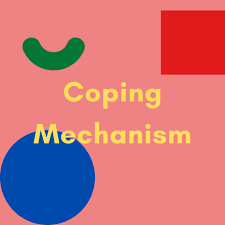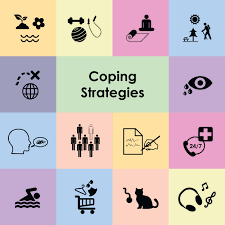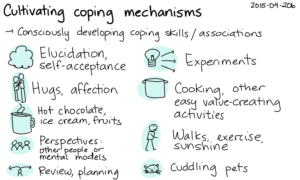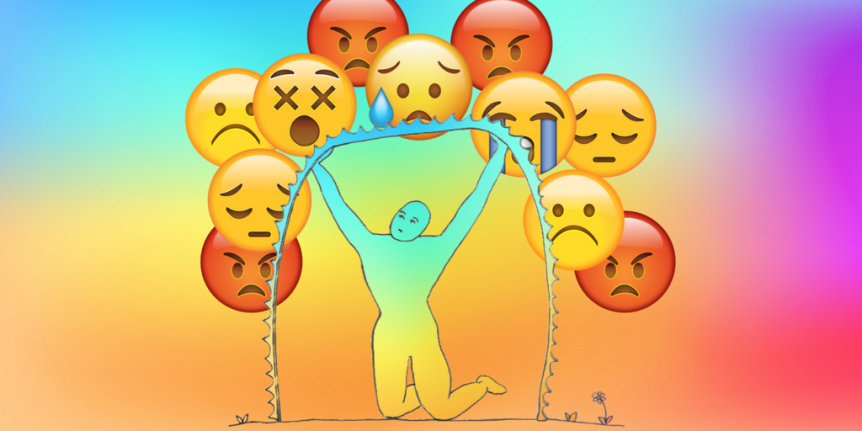Coping mechanisms play a significant role in our lives. They are the methods we use to deal with difficult situations. And they can have a major impact on our mental health. It’s important to understand what coping mechanisms are, how they work. And how to find the right one for you. In this article, we will explore all of these topics in depth. We’ll hear from experts about coping mechanisms, learn about the different types of coping mechanisms. And see how to find the right one for you.
Contents
Understanding Coping Mechanism

A coping mechanism is a process that we use to deal with difficult situations. It can be an internal process, like positive self-talk, or an external process, like talking to a friend. Coping mechanisms help us to cope with stress, anxiety, and other negative emotions.
How Does It Work
Coping mechanisms work by helping us to regulate our emotions. They can help us to feel more in control of our lives and help us to manage difficult situations. When we use a coping mechanism, it helps to change the way that we are feeling. It can make us feel better in the moment and can help us to recover from difficult experiences.
Types of Coping Mechanism
There are many different types of coping mechanisms. Some of the most common ones include:
Internal Coping Mechanism
Visualization: This is a process where we imagine ourselves in a calm and happy place. We focus on positive images and try to relax our minds.
Exercise: Exercise is a great way to release stress and tension. It can also help us to feel better about ourselves and improve our mood.
Journaling: This is a process where we write down our thoughts and feelings. It can be helpful to document what’s going on in our lives. And it can also be helpful to release emotions that we’re holding on to.
Positive self-talk: This is a process where we positively talk to ourselves. We focus on our strengths and try to stay positive even when things are tough.
Relaxation techniques: These are methods that we use to relax our bodies and minds. Some common techniques include yoga, meditation, and deep breathing.
External Coping Mechanism
Talk to friends or family: This is a process where we talk to someone who can understand and support us. It’s important to have someone to talk to when we’re going through a difficult time.
Counseling or therapy: This is a process where we talk to a professional about our thoughts and feelings. Counseling can be helpful for people who are struggling with mental health issues.
Support groups: These are groups of people who are dealing with similar problems. They can provide support and advice, and they can also be a great place to find comfort.
Comparing The Terms

Vs. Defense Mechanism
There is a big difference between coping mechanisms and defense mechanisms. Coping mechanisms are healthy ways to deal with stress or difficult emotions. Defense mechanisms are unhealthy ways to deal with stress or difficult emotions. They may involve denying the problem, pretending it doesn’t exist, or attacking others.
Vs. Coping Style
Coping mechanisms are different from coping styles. The former are specific things that we do to deal with a problem. Whereas, coping styles are the way that we usually deal with problems. Some people use the same coping mechanism for every problem, while others use a variety of methods.
Vs. Coping Strategies
Coping mechanisms are also different from coping strategies. The latter are the overall way that we deal with stress or difficult emotions. They may involve using a combination of coping mechanisms, like positive self-talk and talking to a friend.
Categorizing Coping Mechanisms

There are also many different ways to categorize coping mechanisms. One way is to categorize them by their function. Some common functions include:
Emotional expression: This is a process where we express our emotions openly. We may cry, yell, or write down our thoughts and feelings.
Problem-solving: This is a process where we try to solve the problem that’s causing us stress. We identify the problem, come up with a plan of action, and then take steps to solve the problem.
Distraction: This is a process where we try to distract ourselves from the problem. We may do something fun or relaxing, or we may try to focus on something else entirely.
Suppression: This is a process where we try to push our emotions down. We may not talk about the problem, or we may try to pretend that it’s not affecting us.
NOTE: There are many different types of coping mechanisms, and it’s important to find the right one for you. If you’re struggling to cope with a difficult situation, talk to a friend or family member. Or, seek professional help from a counselor or therapist.
Choosing Coping Mechanism

Not all coping mechanisms are right for everyone. It’s important to choose a coping mechanism that works for you. If you’re not sure what to do, here are some things to consider:
What is the problem?
Identify the problem that’s causing you stress. Once you know what the problem is, you can start to look for a solution.
How do I feel about the problem?
Think about how you feel about the problem. Do you want to solve it, or do you want to distract yourself from it?
What is my goal?
Think about what you want to achieve with your coping mechanism. Do you want to relax, express your emotions, or solve the problem?
Does this coping mechanism fit my personality?
Think about whether or not the coping mechanism fits your personality. If it doesn’t, it may be difficult to stick with it over the long term.
Is this coping mechanism healthy for me?
Consider whether or not the coping mechanism is healthy for you. Some methods, such as suppression, may not be healthy in the long run.
Differentiating B/w Healthy And Unhealthy Coping Mechanism
It’s important to be aware of the difference between healthy and unhealthy coping mechanisms.
Healthy Coping Mechanism
A healthy coping mechanism allows you to deal with a problem positively. It’s something that helps you solve the problem, relaxes your body and mind, or expresses your emotions.
Signs of Healthy Coping Mechanism
There are several ways to tell if your coping mechanism is healthy:
It’s something that:
You can do it every day: A healthy coping mechanism is something that you can do every day without feeling overwhelmed.
You enjoy doing: A healthy coping mechanism should be something that you enjoy doing. It should make you feel good, not bad.
It’s helpful: A healthy coping mechanism is one that actually helps you deal with the problem. It should make the problem feel smaller, not bigger.
Doesn’t harm your body or mind: A healthy coping mechanism shouldn’t harm your body or mind. It should be something that relaxes you, not something that harms you.
Allows you to express your emotions: A healthy coping mechanism should allow you to express your emotions. It should give you a way to let out your feelings in a healthy way.
Examples of Healthy Coping Mechanism
There are many different coping mechanisms out there, so it’s important to find one that fits your personality and lifestyle.
Here are some examples of healthy coping mechanisms:
Yoga: Yoga is a great way to relax your body and mind. It also allows you to express your emotions healthily.
Exercise: Exercise is a great way to deal with stress. It releases endorphins, which can make you feel happy and relaxed.
Journaling: Journaling is a great way to express your thoughts and feelings. It can also help you deal with stress and anxiety.
Talking to a friend: Talking to a friend is a great way to release emotions. It also allows you to get support from someone else.
Now that you know some healthy coping mechanisms, it’s time to find one that works for you! Try out different ones and see which ones make you feel the best. Remember, there is no wrong way to cope with stress!
Unhealthy Coping Mechanism
An unhealthy coping mechanism does not help you deal with the problem positively. It’s something that makes the problem worse, harms your body or mind, or doesn’t allow you to express your emotions.
Signs of Unhealthy Coping Mechanism
There are several ways to tell if your coping mechanism is unhealthy:
It’s something that:
You can’t do it every day: An unhealthy coping mechanism is something that you can’t do every day without feeling overwhelmed.
You don’t enjoy doing: An unhealthy coping mechanism should be something that you don’t enjoy doing. It should make you feel bad, not good.
It’s not helpful: An unhealthy coping mechanism does not actually help you deal with the problem. It should make the problem feel bigger, not smaller.
Harms your body or mind: An unhealthy coping mechanism harms your body or mind. It should be something that relaxes you, not something that harms you.
Prevents you from expressing your emotions: An unhealthy coping mechanism prevents you from expressing your emotions. It should keep your feelings bottled up inside, which can lead to problems later on.
Examples of Unhealthy Coping Mechanism
It’s time now that you know some unhealthy coping mechanisms, as it’s important to avoid them!
Here are some examples of unhealthy coping mechanisms:
Smoking: Smoking is a bad way to deal with stress. It harms your body and can cause cancer.
Drinking alcohol: Drinking alcohol is also a bad way to deal with stress. It can lead to addiction and health problems.
Overeating: Overeating is a bad way to deal with stress. It can lead to weight gain and health problems.
Avoiding the problem: Avoiding the problem is also a bad coping mechanism. It will only make the problem worse in the long run.
NOTE: If you’re using an unhealthy coping mechanism, try to find a healthier alternative. Talk to your doctor or a mental health professional if you’re struggling to cope with a problem. They can help you find the resources and support you need.
Hearing From Experts
Experts agree that it’s important to have a variety of coping mechanisms available to us. Here are some thoughts from experts on coping mechanisms:
“Coping mechanisms are anything we do consciously or unconsciously to deal with stress or difficult emotions.” – Dr. Lynn Bufka, American Psychological Association
“The goal of coping is to minimize the negative impact of stress on our lives.” – Dr. Sally R. Connolly, licensed clinical psychologist
Movies And Books
Many movies and books explore coping mechanisms. Here are a few examples:
The Help: This movie is about African Americans in the early 1960s who work as maids for white families. They must cope with racism and discrimination, but they find strength in each other.
Silver Linings Playbook: This movie is about a man who is coping with mental illness. He learns how to deal with his illness and eventually finds love and happiness.
The Catcher in the Rye: This book is about a teenage boy who is struggling to cope with the death of his brother. He runs away from home and has many adventures along the way.
Conclusion
There are many different coping mechanisms available to us, and it’s important to find the right one for us. If we’re struggling to cope with a difficult situation, we should talk to a friend or family member. Or, we can seek professional help from a counselor or therapist. There are many healthy coping mechanisms out there. So try out different ones until you find one that works for you. Remember, there is no wrong way to cope with stress!
A Word From Therapy Mantra
Your mental health — Your psychological, emotional, and social well-being — has an impact on every aspect of your life. Positive mental health essentially allows you to effectively deal with life’s everyday challenges.
At TherapyMantra, we have a team of therapists who provide affordable online therapy to assist you with issues such as depression, anxiety, stress, workplace Issues, addiction, relationship, OCD, LGBTQ, and PTSD. You can book a free therapy or download our free Android or iOS app.


